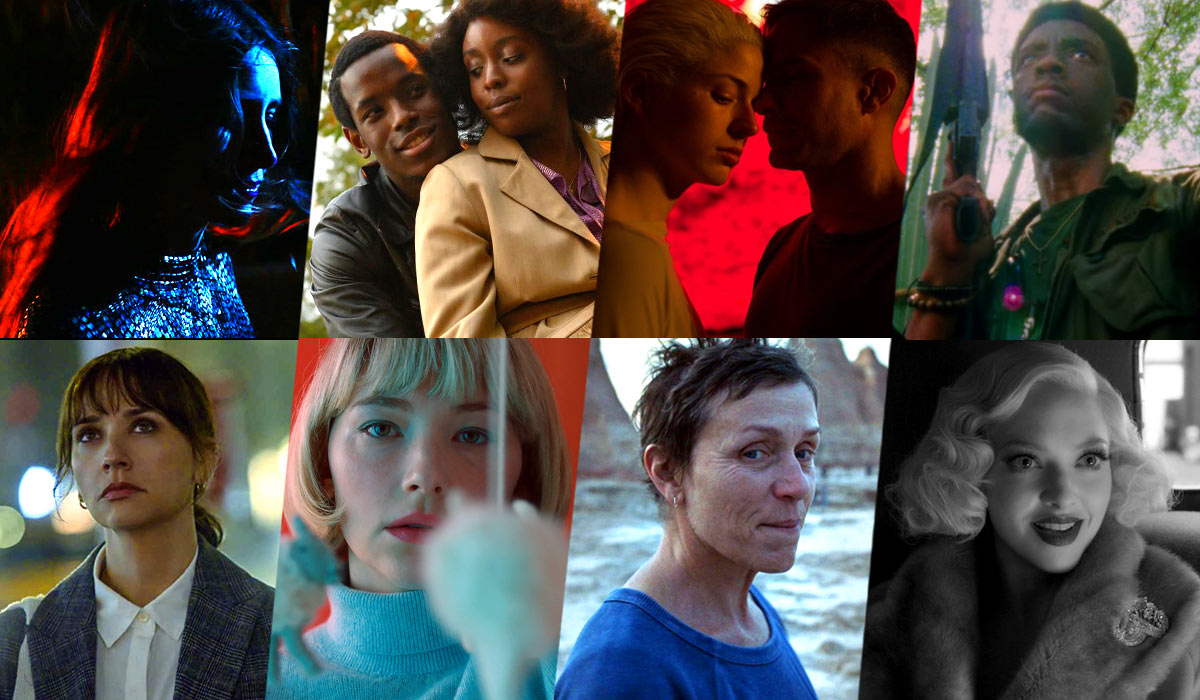“Swallow”
About a woman who develops an unhealthy and dangerous impulse to consume inedible objects—marbles, tacks, nails, batteries—as a kind of flight response to the anxieties of her life, this indie psychological body horror film is definitely anchored by a superb Haley Bennett performance. But the world around her, lensed with gorgeous specificity by Katelin Arizmendi, is its own metaphorical prison. Bennett’s character in the film is out of her element, and from a different class, and director Carlo Mirabella-Davis wisely crafts a flawlessly gorgeous world that to the naked eye is beautiful to look at, but really, just further alienating to the protagonist. The world around her is minimalist, pristine, and immaculately put in place, but it has no life and is suffocating. Bennett is already emotionally stifled and isolated from her husband, his parents, and the foreign world of privilege she has married into, and the movie’s clean, clinical aesthetics are a deeply clever way to subtly unnerve the already anxious character and further push into a retreat of damaging choices. “Swallow,” especially at first, is full of cold, and untouchable beauty, an incredibly sad aesthetic and canny artistic choice that helps push its lead character to the brink. – RP
“Nomadland”
Certified couple Chloé Zhao and Joshua James Richards have worked together since 2015, when they collaborated on her feature debut “Songs My Brothers Taught Me”; the professional side of their relationship continued with 2017’s “The Rider” and has moved ahead with “Nomadland.” Normally, going into business with your significant other is a stairway to Hell and a fast track to sleeping in separate beds, but Zhao and Richards make subtle screen magic together, capturing American landscapes in ways few filmmakers and DPs can, with a level of restraint most wouldn’t. “Nomadland”s gentle aesthetic creates a space where verite meets large scale cultural mythmaking: Where “The Rider” breaks down the classic, macho image of the frontier cowboy, “Nomadland” pecks away at the pretty tales this country tells of how it regards work, and workers, and how people are valued when evicted from our economic structures. “Not all who wander are lost,” wrote J.R.R. Tolkien. Richards’ lens puts those words to proof. – AC
“The Nest”
Upper-class life is a chilly thing, especially when lived while climbing the social ladder one precarious rung after another. Mátyás Erdély, Sean Durkin’s cinematographer on “The Nest,” his first feature nine years after “Martha Marcy May Marlene,” shoots to gelid effect, using slow, steady pacing as things go from bad to worse, from hungry to greedy, for the O’Hara family: Rory (Jude Law), Allison (Carrie Coon), Sam (Oona Roche), and Ben (Charlie Shotwell). Erdély favors gradual zooms, bringing his eye closer and closer to the action, and especially to Allison as Rory’s self-aggrandizing wealth-worshipping bullshit pushes her further to the edge of her patience and the family to the verge of bankruptcy. In his quiet, understated way, Erdély makes “The Nest” a slow burn of self-inflicted torture. – AC
“Possessor”
A VR demo inside a hallucination jammed into a nightmare: That’s Brandon Cronenberg’s “Possessor,” a good movie structured as a bad trip followed by a worse trip und so weiter und so fort. Karim Hussain has his work cut out for him; making sense out of material that by design is meant not to make sense is either Herculean or Sisyphean, and in both cases adds up to a fool’s errand on paper. Fortunately, Hussain isn’t a fool and he’s working with a team of other non-fools whose work, whether in the fields of FX or acting or editing, understand how their contributions must harmonize with his own—and, more importantly, the inverse is true, too. For Hussain, the job comes down to finding the right place for his camera, framing his shots perfectly, and stepping back while sanity unravels before our eyes. – AC
“Devs”
Fusing together reflections and refractions across space, time, and different possible realities within the candescent confines of a Silicon Valley palazzo, “Devs,” takes Oscar Isaac’s megalomaniac “Ex Machina” character’s isolated retreat and upgrades it to a research development facility for quantum engineering, one that seems to have its own private national park inside the property lines. Between breathtaking aerial shots and the compositional splendor that is playing with dazzling luminosity inside geometrical glass interiors, the sensory craft and technical skill alone in Alex Garland’s show are worth applauding, but the series also manages to meld the metaphysical and theological potential of its grander implications re: the dream-altering technology at its center into its design – sometimes slowing the whole world down while every possible future of this moment whizzes past your eyes. Lensed by Garland’s usual DP Rob Hardy, who also shot the gargantuan “Mission Impossible: Fallout,” “Devs” is never afraid to use the frame, always pushing the boundaries of TV’s ever-evolving artistic capacity; it’s a science fiction show with a look that both feels original and breathes through its spiritual nature, a rare feat for the frequently samey aesthetic of the genre these days. – AB





